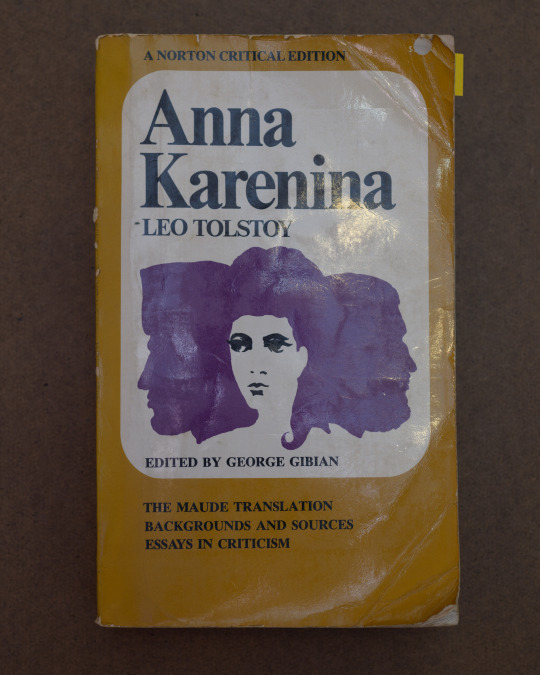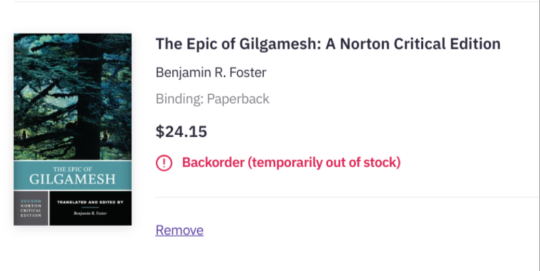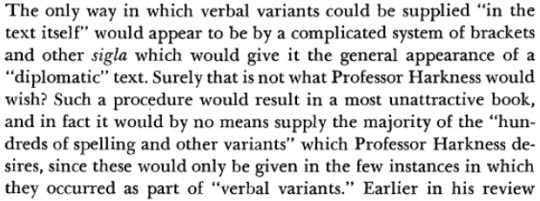#norton critical edition
Text

Join us Thursday, February 16th, at 4PM EST to hear acclaimed scholars Jared Gardner & Jeremy Dauber talk about #WillEisner, his legacy in graphic novels & Jewish literature, and why we teach graphic novels! Sign up at the link above!
#comics#graphic novels#Wil Eisner#Jeremy Dauber#American Comics#jewish literature#american literature#contemporary literature#english majors#english class#literature#speakers series#norton critical edition
3 notes
·
View notes
Text
Book design, then and now
I've been doing some Russian literature reading lately, mostly Chekov. I had occasion to need to check something in Anna Karenina, so I found a copy in the house. Here's the cover of the 1970 Norton Critical Edition:

Sick cover, right? Someone should try this look on Drag Race—silhouette profiles of one's lovers on each side of the head? Awesome. (I have no idea who the artist is, so I can't credit them).
Because I live in the kind of house that has way too many books, I also have the 1995 second edition of this book:

I mean, it's fine, but...so uninspired? It's just a portrait of Anna by Orest Vereisky slapped on to the general format of Norton Critical Editions of that era.
Side by side comparison:

I mean...which one of these would you rather read, just based on cover design? To be fair, the second edition has a lot of newer critical essays that are worth reading, but still...the 1970 design is (imho) much more appealing. We need to bring back cool illustrated covers!
1 note
·
View note
Text
i've been tasked to assemble my christmas wishlist so obv i went to bookshop to look at the reading wishlist i curate and funniest thing to put on my christmas wishlist no doubt is

#alli says shit#like listen. i do want and need it#but it's so funny to scroll past regular ass novels then suddenly. specifically the norton critical edition of the epic of gilgamesh#i won't do it (bc it's out of stock? somehow?) but it is. imagine#what every english major wants under the tree this year...
2 notes
·
View notes
Text
today in hilarious beef in academia (circa 1970), regarding a pair of editors firing back at a professor's critique of their (the editors') work on producing an 'authoritative' edition of Jane Eyre:

id: When Professor Harkness writes: 'I for one would rather have had the MS [manuscript] reading,' he is either relying on dogma or on his own 'critical sensitivity.'
two more screenshots below:
(the edition in question is the 1969 Clarendon Edition, edited by Jane Jack and Margaret Smith)

id: The only way in which verbal variants could be supplied 'in the text itself' would appear to be by a complicated system of brackets and other sigla which would give it the general appearance of a 'diplomatic' text. Surely that is not what Professor Harkness would wish? Such a procedure would result in a most unattractive book, and in fact it would by no means supply the majority of the 'hundreds of spelling and other variants' which Professor Harkness desires, since these would only be given in the few instances in which they occurred as part of 'verbal variants.'

id: This being so, we regard the Explanatory Notes and the Appendices as no less important than the text, and we would have welcomed a fuller discussion of these than the single footnote devoted to them permitted.
#shihpost#yeah so the class assignment is 'finding what scholars regard as the most authoritative edition of the text'#and the professor straight up said 'it will NOT be the NORTON CRITICAL EDITION'#cue a bunch of grad students rethinking what book they want to use#not me though i knew straightaway that jane eyre had publishing history lore 😤😤😤
4 notes
·
View notes
Text
brb engaging in a parasocial relationship with the editor of my favorite classic novel
#this also goes for translators of favorite texts#anyway. hershel parker editor of the norton critical edition of moby dick u understand me like no one else#ace txt
8 notes
·
View notes
Note
totally random but do u have opinions on joseph conrad’s heart of darkness
i so did when i was in high school but i haven't read it since then.
2 notes
·
View notes
Text
I bought some of the Broadview editions of Austen a few years ago at Powell’s, but just got around to reading through the Broadview P&P in particular. It was a bit of a disappointment, but I think that’s probably because I own something in the area of 18 physical copies of P&P, most of which have introductions and commentary, so there wasn’t much new information. I’d have been super into it when I was just getting into Austen criticism in my teens.
There were a few bright spots, though. And the editor shares my opinion that P&P is more likely to be set in the 1790s than the usual 1811-1812 calendar (insofar as it’s set in any specific year at all), so that’s something.
#anghraine babbles#austen blogging#/#//#///#////#/////#a#b#c#d#e#pride and prejudice#i do prefer the norton critical edition and the annotated pride and prejudice (shapard i think?) though both have problems#well not problems. the norton critical edition including excerpts from influential critics IS good#i just think many of those takes are rancid lol#john wiltshire and julia prewitt brown have spectacular takedowns of the stuff i most hate though so my soul knows peace#shapard iirc is a historian and not a literary critic and i think it shows sometimes but the reverse also shows#in usually worse ways. so.#in any case it's mostly good#certainly better than the broadview alas
8 notes
·
View notes
Text
I think it's funny to know for today's entry:
"Boarded by Turkish Customs officers. Backsheesh. All correct. [...] More customs officers [...] Backsheesh again."
Backsheesh means bribe
3 notes
·
View notes
Text

1 note
·
View note
Text
Book Recommendation for National Book Lover's Day
Happy National Book lover's Day! Ever hear of Norton "Critical" Editions of classics? They're one of the best resources for your own library you can possibly have. Read for more!
Photo by Huu1ef3nh u0110u1ea1t on Pexels.com
Happy National Booklover’s Day! Wherever you are in the world today, I hope you are taking some time to read and enjoy your favorite book!
No blog on classic literature would be complete without going into the companies who actually take the time and effort to keep the classics we love in print decade after decade.
There are several companies who…

View On WordPress
#book blogger#bookish#Classic Literature#How to pick a book#National Booklover&039;s Day#Norton Critical Editions#Reading
0 notes
Text

🚨 Calling all #modernism fans! 🚨
Join us Friday, February 17th at 5PM EST to hear esteemed scholar & editor Marc K. Dudley speak on the legacy of Sherwood Anderson's #WinesburgOhio in the classroom & beyond!
Sign up here to attend or get the recording: https://us02web.zoom.us/webinar/register/1916742504508/WN_qxILLgTbR9uYgbLfpS-89g
#modernism#Sherwood Anderson#WinesburgOhio#Winesburg Ohio#modern literature#modernist literature#american literature#american lit#classic literature#bookchat#book chat#NCENLSpeakers Series#Norton Critical Edition
0 notes
Text
so I am currently rereading Dracula (again) for Dracula Daily, using an annotated edition I bought for a course on vampire literature I took in college.
simultaneously, and in large part to avoid Grant Deadlines, I am also reading Harrow the Ninth. For the very first time this morning, I shed a tear of compassion for the editors of the inevitable Critical Annotated Edition of The Locked Tomb, a century on from now, having to write extensively cited footnotes about The Bible, Shakespeare, and None Pizza with Left Beef.
#imagine humanity surviving even 100 more years at the rate we’re going#never let it be said that I’m anything less than An Eternal Optimist#the locked tomb#dracula daily#norton critical editions my beloved
1 note
·
View note
Text
Now that Dracula Daily is over, I decided to go through my copy of the novel (Norton critical edition) to look for interesting footnotes and read the various essays/etc. at the back.
Here's some of my favorite footnotes:
An enlarged thyroid gland resulting in a swollen neck; one symptom of iodine deficiency; particularly common in some mountainous regions; may cause brain damage.
—Page 15/May 5, after Jonathan mentions seeing a lot of people with 'goitre' as he is driven out of town and up towards Castle Dracula. Didn't notice this detail at all, but it plays around with possible signs of being fed upon, mundane medical causes, and also maybe an association with madness and superstition. A neat touch.
The word strange in late Victorian England was often suffused with homoerotic undercurrents.
—Page 30/May 7, after Jonathan says "It may be that this strange night-existance is telling on me". Did not know that 'strange' was apparently a gay word in a way 'queer' (or even 'gay') was not at the time. Gives that line a kind of different possible reading... and now I kind of want to search up where else in the text that word is used.
A port city in Yorkshire, on the North Sea coast of England; in the 1890s, a vacation resort where Bram Stoker spent many summers. Whitby's eerie charm is a good setting for the ensuing action. It shares the harsh beauty of nearby Bronte country; moreover, in Victorian England its best-known product was the black stone worn as part of the mourning costume - mourning stone, or jet - a local industry now displaced by Dracula tours.
—Page 63/July 24, after the location is mentioned. Love the detail about the mourning stones.
"Not only Mr. Swales' preoccupations, but even his name, associate him with living death. The English Dialect Dictionary (1898) provides a revealing North Yorkshire definition of the verb "swale": "to consume or waste away; to melt or gutter as a candle in a draught."
—Page 66/July 24, after Mr. Swales' big speech on death. I can't believe he was actually named "Mr. Is-Dying".
Seward distributes his medical reports profigately.
—Page 105/September 2, in response to the line: "I reminded her that a doctor's confidence was sacred;" - I'm just laughing at the snarky footnote here.
This is the first and last we hear of Van Helsing's third career (he is also a physician and a professor). Characteristically, he uses his legal expertise to circumvent the law.
—Page 148/September 20, after VH says he is a lawyer. Characteristically indeed, ahaha.
Various late Victorian tonics used the advertising slogan "The Blood is the Life." Renfield might be referring to Hughe's Blood Pills or Clarke's World-Famed Blood Mixture. Both claimed to vitalize the body by purifying the blood.
—Page 207/September 30, after Renfield tells Mina that he tried to kill Seward while inspired by the Biblical phrase 'the blood is the life': "'Though, indeed, the vendor of a certain nostrum has vulgarized the truism to the very point of contempt.'" I just never really put together that this quote had been used as an advertising slogan and it's making me crack up. Imagine your mental patient attacking you and slurping your blood off the floor, then shouting "Ba-da-da-da, I'm loving it!" while being dragged away. (I know that's not the most direct comparison but it's the one that popped into my head and it's very funny.)
Again, the British characters have more difficulty communicating with each other than with the Romanian vampire.
—Page 231/October 1, after Jonathan is misled by phonetic/dialectic spelling. Even the footnotes are getting fed up with this dialect nonsense, Bram.
#dracula daily#jonathan harker#mr. swales#renfield#jack seward#van helsing#norton notes#i'm gonna add any interesting bits from the other sections as well if i find them. so this'll be the tage used for that
674 notes
·
View notes
Text
Since none of my work has met my own standards, I must judge it on the basis of that one which caused me the most grief and anguish, as the mother loves the child who became a thief or murderer more than the one who became the priest.
William Faulkner, on The Sound and the Fury, quoted in the Norton Critical Edition
145 notes
·
View notes
Text
It's pretty well known, I think, that the 1899 American version of Dracula contains a line which the British version doesn't: Dracula tells the women "To-night is mine; tomorrow night, tomorrow night is yours!", but the first clause was not present in the original British version nor any subsequent English release.
I may have found another discrepancy between the American and British versions.


In the Dracula Daily screenshot, which seems to use the American text, Jonathan comments on the room where he's later attacked by the women that it must have been "occupied by ladies in bygone days". In my British Norton Critical Edition, edited by Auerbach and Skal, he only says it must have been "occupied in bygone days".
Auerbach and Skal, to their credit, make explicit note of the omission of "To-night is mine" on the relevant page. That footnote goes on to say that "Stoker's deletion of this sentence was understandable, for it leads to a different novel, one probably unpublishable in 1897 England. Stoker may have imagined that the America that produced his hero Walt Whitman would be more tolerant of men feeding on men".
They don't comment on the omission of "by ladies". For all I know, this might be a print error in mine. But if it isn't, I wonder if Stoker felt that Jonathan's identification with the image he has in his head of these long-gone women would be made too obvious by the association between this being the women's wing and it having "more air of comfort" than any other he'd seen in the castle.
#Dracula#Dracula Daily#sorta i guess#I'm a bit proud I noticed this discrepancy#It's very useful having more than one version of the text available#And it's all thanks to Matt Kirkland#How many other tiny changes could there be between versions?
95 notes
·
View notes
Text

I want to share my footnote, from the third Norton Critical edition:

Idk man, I guess dick jokes are timeless
99 notes
·
View notes